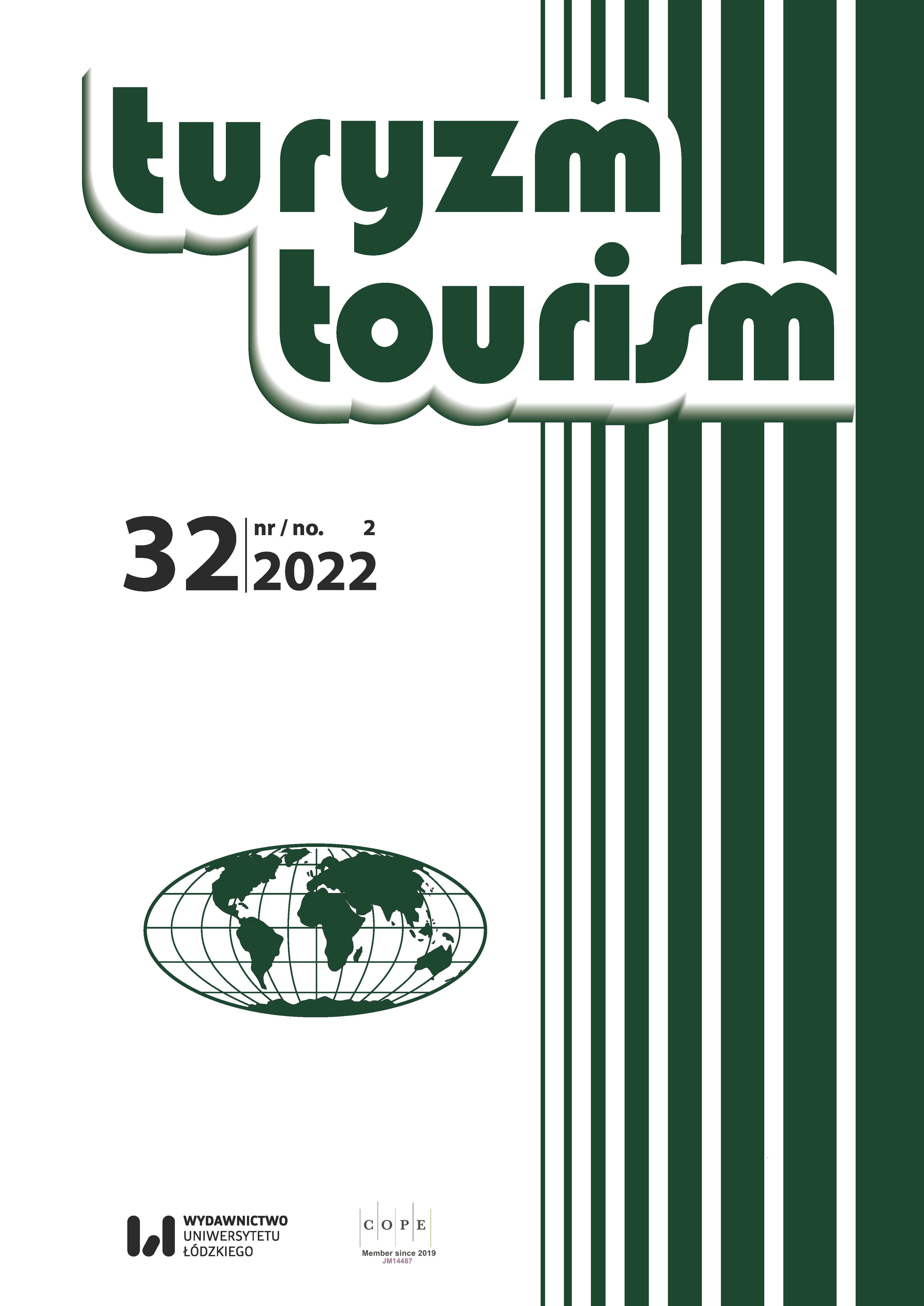The paradox of rural tourism and poverty alleviation
DOI:
https://doi.org/10.18778/0867-5856.32.2.05Keywords:
competitiveness, index, poverty, rural, tourismAbstract
This research aims to analyze factors determining the competitiveness of rural tourism and assess its performance compared to the poverty level in each province in Indonesia. We employ four main pillars: enabling environment; travel and tourism policy and enabling conditions; infrastructure; and natural & cultural resources adopted from the Travel and Tourism Competitiveness Index of the World Economic Forum 2019. We conducted fieldwork in four provinces, namely Aceh, Bali, Central Java, and North Sulawesi, by spreading questionnaires and giving semi-structured interviews to obtain respondents’ insights. The poverty gap index measures the intensity level of poverty by employing an expenditure-based poverty line. This study discovers that infrastructure, natural & cultural resources, and enabling environment support rural tourism development in each province. We also find that the excellent performance of rural tourism competitiveness seems to have minimal impact on poverty. Bali has become the major icon of tourism in Indonesia; ironically, its poverty level is relatively higher than in other areas. Meanwhile, Central Java ranks as the second most competitive province after Bali, while the poverty level is the lowest. Our study offers community-based tourism (CBT) and corporate social responsibility (CSR) to resolve the situation.
Downloads
References
Anismar, Satria, D., Ali, M. (2018). Religious tourism: Concept of community-based tourism in Aceh Singkil, Indonesia. Proceedings of MICoMS 2017 (Emerald Reach Proceedings Series), 1, 283–288. https://doi.org/10.1108/978-1-78756-793-1-00086
Google Scholar
DOI: https://doi.org/10.1108/978-1-78756-793-1-00086
Arintoko, A., Ahmad, A.A., Gunawan, D.S., Supadi, S. (2020). Community-based tourism village development strategies: A case of Borobudur Tourism Village Area, Indonesia. GeoJournal of Tourism and Geosites, 29 (2), 398–413. https://doi.org/10.30892/gtg.29202-477
Google Scholar
DOI: https://doi.org/10.30892/gtg.29202-477
Beeton, S. (2006). Community Development Through Tourism. Collingwood (Australia): Landlinks Press.
Google Scholar
DOI: https://doi.org/10.1071/9780643093881
Campbell, C.L., Heck, W.W. (2017). An ecological perspective on sustainable development. In: F. Douglas Muschett (ed.), Principles of Sustainable Development (pp. 47–67). Boca Raton (Florida): CRC Press.
Google Scholar
DOI: https://doi.org/10.1201/9780203742051-2
Chifon, G.N. (2010). The role of sustainable tourism in poverty alleviation in South Africa: A case study of the Spier tourism initiative [Doctoral dissertation]. University of the Western Cape. Retrieved from: http://etd.uwc.ac.za/xmlui/bitstream/handle/11394/2305/Chifon_MA_2010.pdf?sequence=1 (12.01.2022).
Google Scholar
Chin, C.H., Thian, S.S.-Z., Lo, M.C. (2017). Community’s experiential knowledge on the development of rural tourism competitive advantage: A study on Kampung Semadang – Borneo Heights, Sarawak. Tourism Review, 72 (2), 238–260. https://doi.org/10.1108/TR-12-2016-0056
Google Scholar
DOI: https://doi.org/10.1108/TR-12-2016-0056
Coles, T., Fenclova, E., Dinan, C. (2013). Tourism and corporate social responsibility: A critical review and research agenda. Tourism Management Perspectives, 6, 122–141. https://doi.org/10.1016/j.tmp.2013.02.001
Google Scholar
DOI: https://doi.org/10.1016/j.tmp.2013.02.001
Croes, R. (2014). The role of tourism in poverty reduction: An empirical assessment. Tourism Economics, 20 (2), 207–226. https://doi.org/10.5367/te.2013.0275
Google Scholar
DOI: https://doi.org/10.5367/te.2013.0275
Dana, L.P. (1999). Entrepreneurship in Pacific Asia. Past, present and future. Singapore: World Scientific. https://doi.org/10.1142/4150
Google Scholar
DOI: https://doi.org/10.1142/4150
Das, M., Chatterjee, B. (2015). Ecotourism: A panacea or a predicament? Tourism Management Perspectives, 14, 3–16. https://doi.org/10.1016/j.tmp.2015.01.002
Google Scholar
DOI: https://doi.org/10.1016/j.tmp.2015.01.002
Driscoll, L., Hunt, C.A., Honey, M., Durham, W. (2011). Assessing the Importance of ecotourism as a development and conservation tool in the Osa Peninsula, Costa Rica. Final report. Vol. 37 (issue April). Washington–Stanford: Center for Responsible Travel (CREST).
Google Scholar
Ernawati, N.M., Sanders, D., Dowling, R. (2017). Host-guest orientations of community-based tourism products: A case study in Bali, Indonesia. International Journal of Tourism Research, 19 (3), 367–382. https://doi.org/10.1002/jtr.2119
Google Scholar
DOI: https://doi.org/10.1002/jtr.2119
FAO (2019). Overview rural poverty in Latin America and the Carribean: Solution for eliminating Rural Poverty in the 21st century. Retrieved from: http://www.fao.org/3/ca2275en/CA2275EN.pdf (4.01.2022).
Google Scholar
Farrington, J., Mitchell, J. (2006). How can the rural poor participate in global economic processes? Natural Resource Perspectives, 103. Retrieved from: https://cdn.odi.org/media/documents/46_y9hl1ap.pdf (4.01.2022).
Google Scholar
Fiorello, A., Bo, D. (2012). Community-based ecotourism to meet the new tourist’s expectations: An exploratory study. Journal of Hospitality Marketing & Management, 21 (7), 758–778. https://doi.org/10.1080/19368623.2012.624293
Google Scholar
DOI: https://doi.org/10.1080/19368623.2012.624293
Firdaus, Hardjosoekarto, S., Lawang, R.M.Z. (2021). The role of local government on rural tourism development: Case study of Desa Wisata Pujonkidul, Indonesia. International Journal of Sustainable Development and Planning, 16 (7), 1299–1307. https://doi.org/10.18280/ijsdp.160710
Google Scholar
DOI: https://doi.org/10.18280/ijsdp.160710
Fotiadis, A., Yeh, S.-S., Huan, T.-C.T.C. (2016). Applying configural analysis to explaining rural-tourism success recipes. Journal of Business Research, 69 (4), 1479–1483. https://doi.org/10.1016/j.jbusres.2015.10.128
Google Scholar
DOI: https://doi.org/10.1016/j.jbusres.2015.10.128
Giampiccoli, A., Saayman, M. (2016). Community-based tourism: From a local to a global push. Acta Commercii. Independent Research Journal in the Management Sciences, 16 (1). https://doi.org/10.4102/ac.v16i1.372
Google Scholar
DOI: https://doi.org/10.4102/ac.v16i1.372
Hazari, B.R., Nowak, J.J., Sahli, M., Zdravevski, D. (2003). Tourism and regional immiserization. Pacific Economic Review, 8 (3), 269–278. https://doi.org/10.1111/j.1468-0106.2003.00227.x
Google Scholar
DOI: https://doi.org/10.1111/j.1468-0106.2003.00227.x
Hughes, E., Scheyvens, R. (2018). Development alternatives in the Pacific: How tourism corporates can work more effectively with local communities. Tourism Planning & Development, 15 (5), 516–534. https://doi.org/10.1080/21568316.2018.1478881
Google Scholar
DOI: https://doi.org/10.1080/21568316.2018.1478881
Indonesian Central Statistics Agency (2018). Hasil Pendataan Potensi Desa 2018. Badan Pusat Statistik. Retrieved from: https://www.bps.go.id/pressrelease/2018/12/10/1536/hasil-pendataan-potensi-desa--podes--2018.html (17.01.2022).
Google Scholar
Indonesian Central Statistics Agency (2020). Statistik Indonesia 2020. Badan Pusat Statistik. Retrieved from: https://www.bps.go.id/publication/2020/04/29/e9011b3155d45d70823c141f/statistik-indonesia-2020.html (17.01.2022).
Google Scholar
DOI: https://doi.org/10.1787/9faa9816-en
Iorio, M., Corsale, A. (2014). Community-based tourism and networking: Viscri, Romania. Journal of Sustainable Tourism, 22 (2), 234–255. https://doi.org/10.1080/09669582.2013.802327
Google Scholar
DOI: https://doi.org/10.1080/09669582.2013.802327
Jamieson, W., Pallavi, M. (2002). Exploration of the national policy issues related to the use of tourism development in poverty reduction in Southeast Asia. In: Conference Proceedings – Tourism in Asia. Hong Kong: Hong Kong Polytechnic University.
Google Scholar
Jolliffe, D., Prydz, E.B. (2016). Estimating international poverty lines from comparable national thresholds. The Journal of Economic Inequality, 14 (2), 185–198. https://doi.org/10.1007/s10888-016-9327-5
Google Scholar
DOI: https://doi.org/10.1007/s10888-016-9327-5
Jovanović, S., Ilić, I. (2016). Infrastructure as important determinant of tourism development in the calculateries of Southeast Europe. Ecoforum, 5 (1), 288–294. http://www.ecoforumjournal.ro/index.php/eco/article/view/329/216 (3.02.2022).
Google Scholar
Leung, N.H.L., Chu, D.K.W., Shiu, E.Y.C., Chan, K.-H., McDevitt, J.J., Hau, B.J.P., Yen, H.-L., Li, Y., Ip, D.K.M., Peiris, J.S.M., Seto, W.-H., Leung, G.M., Milton, D.K., Cowling, B.J. (2020). Respiratory virus shedding in exhaled breath and efficacy of face masks. Nature Medicine, 26 (5), 676–680. https://doi.org/10.1038/s41591-020-0843-2
Google Scholar
DOI: https://doi.org/10.1038/s41591-020-0843-2
Liu, J., Qu, H., Huang, D., Chen, G., Yue, X., Zhao, X., Liang, Z. (2014). The role of social capital in encouraging residents’ pro-environmental behaviors in community-based ecotourism. Tourism Management, 41, 190–201. https://doi.org/10.1016/j.tourman.2013.08.016
Google Scholar
DOI: https://doi.org/10.1016/j.tourman.2013.08.016
Luvanga, N., Shitundu, J. (2003). The role of tourism in poverty alleviation in Tanzania. Dar Es Salaam: Mkuki Na Nyota Publishers Ltd. Retrieved from: https://media.africaportal.org/documents/03.4_-_Luvanga_Shitundu_.pdf (12.01.2022).
Google Scholar
Makoka, D., Kaplan, M. (2005). Poverty and vulnerability – an interdisciplinary approach. Munich Personal RePEc Archive (MPRA), 6964, 1–34. Retrieved from: https://mpra.ub.uni-muenchen.de/6964/1/poverty_and_vulnerability.pdf (17.01.2022).
Google Scholar
Melio, M.S. (2015). The challenges of poverty measurement in the Arab region. The IARIW-CAPMAS Special Conference, 1–19. Retrieved from: http://old.iariw.org/egypt2015/magedmelio.pdf (17.01.2022).
Google Scholar
Milanovic, B. (2002). True world income distribution, 1988 and 1993: First calculation based on household surveys alone. The Economic Journal, 112 (476), 51–92. https://doi.org/10.1111/1468-0297.0j673
Google Scholar
DOI: https://doi.org/10.1111/1468-0297.0j673
Morduch, J., Haley, B. (2002). Analysis of the effects of microfinance on poverty reduction. NYU Wagner Working Papers Series, 1014. Retrieved from: http://pdf.wri.org/ref/morduch_02_analysis_effects.pdf (4.01.2022).
Google Scholar
Naumov, N., Varadzhakova, D., Naydenov, A. (2021). Sanitation and hygiene as factors for choosing a place to stay: Perceptions of the Bulgarian tourists. Anatolia. An International Journal of Tourism and Hospitality Research, 32 (1), 144–147. https://doi.org/10.1080/13032917.2020.1771742
Google Scholar
DOI: https://doi.org/10.1080/13032917.2020.1771742
Njoya, E.T., Seetaram, N. (2018). Tourism contribution to poverty alleviation in Kenya: A dynamic computable general equilibrium analysis. Journal of Travel Research, 57 (4), 513–524. https://doi.org/10.1177/0047287517700317
Google Scholar
DOI: https://doi.org/10.1177/0047287517700317
OECD (2014). OECD factbook 2014: Economic, environmental and social statistics. OECD Publishing. https://doi.org/10.1787/factbook-2014-en
Google Scholar
DOI: https://doi.org/10.1787/factbook-2014-en
Oh, C.-O. (2005). The contribution of tourism development to economic growth in the Korean economy. Tourism Management, 26 (1), 39–44. https://doi.org/10.1016/j.tourman.2003.09.014
Google Scholar
DOI: https://doi.org/10.1016/j.tourman.2003.09.014
Pizam, A., Tasci, A.D.A. (2019). Experienscape: Expanding the concept of servicescape with a multi-stakeholder and multi-disciplinary approach (invited paper for ‘luminaries’ special issue of International Journal of Hospitality Management). International Journal of Hospitality Management, 76 (B), 25–37. https://doi.org/10.1016/j.ijhm.2018.06.010
Google Scholar
DOI: https://doi.org/10.1016/j.ijhm.2018.06.010
Rembulan, C.L., Helmi, A.F., Riyono, B. (2020). The fluid power: Constructing the concept of power in community-based tourism in Indonesia. Journal of Enterprising Communities: People and Places in the Global Economy, 14 (4), 515–537. https://doi.org/10.1108/JEC-03-2020-0041
Google Scholar
DOI: https://doi.org/10.1108/JEC-03-2020-0041
Riyanto, Massie, N.W.G., Hartono, D., Revindo, M.D., Usman, Riyadi, S.A., Puspita, N., Wikarya, U. (2020). The impact of tourism on poverty alleviation and income distribution: Evidence from Indonesia. LPEM-FEB UI Working Paper 047. https://www.lpem.org/wp-content/uploads/2020/04/WP-LPEM-047-The-Impact-of-Tourism-on-Poverty-Alleviation.pdf (28.01.2022).
Google Scholar
Saboor, A., Hussain, M., Mushtaq, K. (2006). Trends of rural poverty and total factor productivity growth in Pakistan’s agriculture : A time series analysis. Journal of Agriculture & Social Sciences, 2 (1), 26–28. Retrieved from: http://www.fspublishers.org/published_papers/19071_..pdf (3.02.2022).
Google Scholar
Seftyono, C. (2011). Pengetahuan Ekologi Tradisional Masyarakat Orang Asli Jakun dalam Menilai Ekosistem Servis di Tasik Chini, Malaysia. Jurnal Ilmu Sosial dan Ilmu Politik, 15 (1), 55–67. Retrieved from: https://journal.ugm.ac.id/jsp/article/view/10925 (28.01.2022).
Google Scholar
Sifuentes, L.Y., Koenig, D.W., Phillips, R.L., Reynolds, K.A., Gerba, C.P. (2014). Use of hygiene protocols to control the spread of viruses in a hotel. Food and Environmental Virology, 6 (3), 175–181. https://doi.org/10.1007/s12560-014-9158-0
Google Scholar
DOI: https://doi.org/10.1007/s12560-014-9158-0
Simons, I., de Groot, E. (2015). Power and empowerment in community-based tourism: Opening Pandora’s box? Tourism Review, 70 (1), 72–84. https://doi.org/10.1108/TR-06-2014-0035
Google Scholar
DOI: https://doi.org/10.1108/TR-06-2014-0035
Soeswoyo, D.M., Jeneetica, M., Dewi, L., Dewantara, M.H., Asparini, P.S. (2021). Tourism potential and strategy to develop competitive rural tourism in Indonesia. International Journal of Applied Sciences in Tourism and Events, 5 (2), 131–141. https://doi.org/10.31940/ijaste.v5i2.131-141
Google Scholar
DOI: https://doi.org/10.31940/ijaste.v5i2.131-141
Su, B. (2011). Rural tourism in China. Tourism Management, 32 (6), 1438–1441. https://doi.org/10.1016/j.tourman.2010.12.005
Google Scholar
DOI: https://doi.org/10.1016/j.tourman.2010.12.005
Sudiarta, I.N., Suardana, I.W. (2016). Dampak Pariwisata terhadap Kemiskinan di Kawasan Pariwisata di Bali. Jurnal Kajian Bali (Journal of Bali Studies), 6 (2), 209–227. Retrieved from: https://ojs.unud.ac.id/index.php/kajianbali/article/view/24361/15804 (4.01.2022).
Google Scholar
Swesti, W. (2019). Dampak Pariwisata Terhadap Kondisi Sosial Budaya Masyarakat di Banda Aceh (The social-cultural impact of tourism in Banda Aceh). Jurnal Kepariwisataan Indonesia: Jurnal Penelitian Dan Pengembangan Kepariwisataan Indonesia, 13 (2), 49–65. https://doi.org/10.47608/jki.v13i22019.49-65
Google Scholar
DOI: https://doi.org/10.47608/jki.v13i22019.49-65
UNWTO (2006). Poverty alleviation through tourism – A compilation of good practices (english version). Madrid: UNWTO. https://doi.org/10.18111/9789284409204
Google Scholar
DOI: https://doi.org/10.18111/9789284409204
UNWTO (2020). UNWTO recommendations on tourism and rural development – A guide to making tourism an effective tool for rural development. Madrid: UNWTO. https://doi.org/10.18111/9789284422173
Google Scholar
DOI: https://doi.org/10.18111/9789284422173
Vaishar, A., Šťastná, M. (2022). Impact of the COVID-19 pandemic on rural tourism in Czechia Preliminary considerations. Current Issues in Tourism, 25 (2), 187–191. https://doi.org/10.1080/13683500.2020.1839027
Google Scholar
DOI: https://doi.org/10.1080/13683500.2020.1839027
Vilnai-Yavetz, I., Gilboa, S. (2010). The effect of servicescape cleanliness on customer reactions. Services Marketing Quarterly, 31 (2), 213–234. https://doi.org/10.1080/15332961003604386
Google Scholar
DOI: https://doi.org/10.1080/15332961003604386
World Bank (2009). Handbook on poverty and inequality. Washington: The World Bank. https://doi.org/10.1596/978-0-8213-7613-3
Google Scholar
DOI: https://doi.org/10.1596/978-0-8213-7613-3
Yu, J., Seo, J., Hyun, S.S. (2021). Perceived hygiene attributes in the hotel industry: customer retention amid the COVID-19 crisis. International Journal of Hospitality Management, 93, 102768. https://doi.org/10.1016/j.ijhm.2020.102768
Google Scholar
DOI: https://doi.org/10.1016/j.ijhm.2020.102768
Yusof, Y., Ibrahim, Y., Muda, M.S., Amin, W.A.A.W.M. (2012). Community based tourism and quality of life. Review of Integrative Business and Economic Research, 1 (1), 335–345. Retrieved from: http://sibresearch.org/uploads/2/7/9/9/2799227/riber2012-238_335-345.pdf (12.01.2022).
Google Scholar
Zapata, M.J., Hall, C.M., Lindo, P., Vanderschaeghe, M. (2011). Can community-based tourism contribute to development and poverty alleviation? Lessons from Nicaragua. Current Issues in Tourism, 14 (8), 725–749. https://doi.org/10.1080/13683500.2011.559200
Google Scholar
DOI: https://doi.org/10.1080/13683500.2011.559200
Downloads
Published
How to Cite
Issue
Section
License

This work is licensed under a Creative Commons Attribution-NonCommercial-NoDerivatives 4.0 International License.










